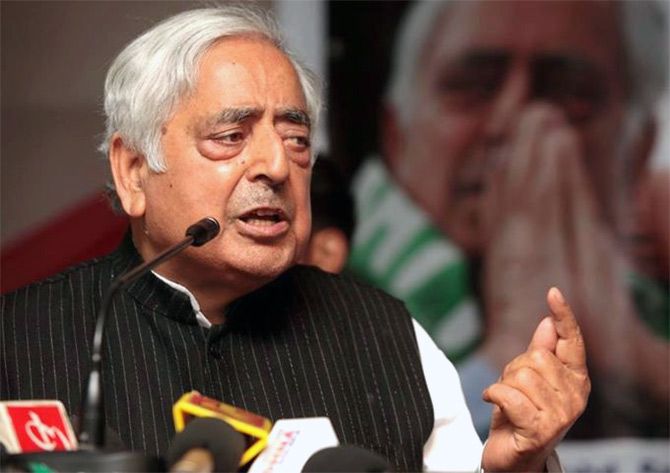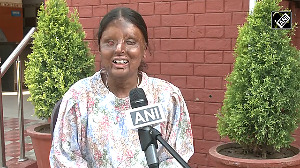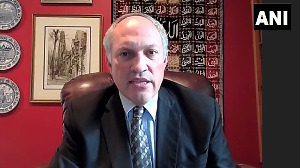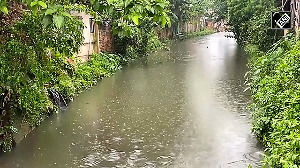
'Mufti is much more mellowed, much more accommodating. He knows he is stuck and he knows that he cannot retreat now.'
'Not so many Pandits want to go back. There is fear as well.'
The second part of former R&AW chief A S Dulat's exclusive interview with Sheela Bhatt/Rediff.com
How do you see the Kashmir situation in the global context, where the Islamic State and Taliban dominate geo-strategic issues?
Muftisaab (Jammu and Kashmir Chief Minister Mufti Mohammad Sayeed) has presented himself as very soft on separatists. But let us make no mistake about it, he is a nationalist. He was a home minister in Delhi, he is not pro-Pakistani, not pro-militancy. But, yes, you could say he has been more sympathetic to the separatists than Farooq Abdullah has been.
The reason is that Muftisaab has used that kind of politics. In 2002 also, he had made use of his old friendship with the Jamaat and I do not blame him for it because his friendship goes back to the Congress days and it was the Congress which encouraged the Jamaat against Sheikh Abdullah at one time. So Mufti has used that card in his politics.
My own conviction is that no mainstream leader, whether it is Muftisaab or Farooq or Omar Abdullah, or for that matter even Mehbooba Sayeed, would like the separatists to grow.
You know, this 'talk to the separatists' is a kind of show-off. They say we want everybody. But no mainstream leader wants a genuine engagement with the separatists because they always fear that their position will be challenged.
See, in Kashmir nobody has got a majority since long. After 1996 no party has had a majority in J&K. So they feel they might be compromised. So yes, Muftisaab is sympathetic and rightly sympathetic because he gains by that. And it is a well known fact that he is a very good friend of (Syed Ali Shah) Geelani.
Where the friendship stands today I do not know, but he has been a friend of Geelani. The Peoples Democratic Party was the first to advocate, not Muftisaab, but Mehbooba has advocated taking them into the mainstream.
How is the performance of the new government on the development front?
There is nothing on the ground. It is zero.
Talking of Srinagar, the roads are in a very bad shape, traffic is in a terrible shape, everything looks bad, tourism is in a bad shape thanks to our media here. Everybody says the media plays up that there is disturbance, they show Pakistani flags, this, that and all...
There is no disturbance. Srinagar is better than ever in terms of security. Our media has played up small issues. Thanks to that, we see a lack of interest in development.
Is the security situation under control?
Absolutely. There has been no compromise on that.
Do you agree with the government that there should be a colony for Kashmiri Pandits and they should return in batches, to certain geographical areas in the Valley?
This colony would be a disastrous idea. Because the Pandits belong there and those who want to go back should go back in normal ways. This process should be supported not only by Delhi, but by Srinagar also.
What has happened is -- even Geelani has said it -- this is one thing on which every Kashmiri leader has said the same thing, that the Kashmiri Pandits are our brethren and they should come back. I think we are not taking advantage of that.
Some Pandits are asking why they should be sitting ducks.
There will be more sitting ducks if there are colonies because they will be attacked then with precision.
And no government can provide individual security.
They have Pandits living in the city, there are Pandits in the Valley. They have fought elections this time and before as well.
Those who want to go back should go back, gradually. And I will tell you one more thing, that the numbers are hyped up. Not so many Pandits want to go back. There is fear as well.
No matter what you make -- colony, camp whatever -- the fear will still remain. And that colony has to be within Kashmir, within Srinagar or somewhere there. It cannot be in Delhi. This is the worst way of handling the Pandits' issue.
See, there are certain safe areas in Kashmir. Although most of the Pandits live downtown, but if security is the main issue, then there are certain colonies, Raj Bagh, Jawahar Nagar, Ram Munshi Bagh, these are safer areas, towards Civil Lines where there is more security and where people feel safer and many non-Muslims are living there. So they can be provided houses there.
How do you look at India-Pakistan relations now, and how is it helping the Kashmir issue? How do you see the bigger picture?
See, the impact on Kashmir is very straightforward. When India-Pakistan relations are good, the situation in Kashmir automatically eases. The people feel relieved that they are not going to be stuck between the two sides. Otherwise, they think they will be pressed between the two. So they are happy if India-Pakistan relations improve.
As far as Pakistan goes -- and I have interacted with a lot of Pakistanis on Track II -- I can tell you that post the Mumbai terror attacks, particularly in the last three years, Pakistanis have lost all interest in Kashmir.
Whatever they say in regard to Kashmir, whether Asif Zardari goes and talks about a 1,000 year war or Nawaz Sharif talks about the UN resolution, it is only lip service.
When such extreme statements are made even Kashmiris laugh and say that Pakistan is not serious about Kashmir.
But if we do not pay attention to Kashmir, where we differ from Pakistan or where Pakistan scores above us despite the loss of interest and despite the contempt for Kashmiris -- which we do not have because they are a part of our country -- Pakistan never loses focus on Kashmir. In their society there are always elements there which work for Kashmir.
Whereas we work on an ad hoc basis. Like if there is a matter of security, then work on security. If there is a problem of an interlocutor, find an interlocutor. If there is a need to talk, we will talk. If we need to make Muftisaab the CM we will make him. If we do not like him, we will get Farooq.
This ad hoc attitude is there since long. Now there must be some clear thinking. I feel Muftisaab should be supported in taking the issue further.
You have met Mufti recently. What is his game plan?
Muftisaab is very different now from the Mufti of 2002. He is much more mellow, much more accommodating. He knows he is stuck and he knows that he cannot retreat now.
The three years of Muftisaab -- his earlier tenure in power -- are remembered mostly for his healing touch. Now he is not saying any of it. He is not talking of healing.
Wherever he goes he is saying we will make international clubs here, an international golf course there. You are talking of international projects, but at least make the basics, get the roads repaired in Srinagar, have traffic control.
On the political front he is going out of the way to be reasonable. In his conversation with me he was also justifying Delhi's decisions. When we were talking of certain things he said (Prime Minister Narendra) Modi is right. He recently made a statement that Modi is an inclusive leader, whatever he is doing is right.
But this is one place where the government could fall on small issues. There is only X amount to which you can push Muftisaab or anyone. Where that X point is, I do not know, but my only request is please do not push him beyond that point. Muftisaab is being very reasonable and very accommodating.
There have been two major problems recently. Even the smallest problems become huge there. One is Geelani's passport. Muftisaab has not said anything (about it), Mehbooba has. (Defence Minister Manohar) Parrikar's statement (to neutralise terrorists with terrorists) also created a shock. Ex-Ikhwani legislators, who were terrorists fighting terrorists, have criticised the minister and have asked why is Muftisaab not expressing his views on it.
So Muftisaab is being very conscious, very careful, very accommodating.
Why did Parrikar say that?
I think it is madness. Why should a defence minister talk like that? We say here that Pakistan is involved in terrorism, has proxies, does State-funded terrorism. Even if someone else says it does not look good, so why should a defence minister say such things?
Even our chief of R&AW does not say it. You do it if you have to do, people all over the world do it, but you do not talk about it. If something happens tomorrow, people would say your defence minister has done this.
What is the BJP's game-plan vis-a-vis Mufti?
What Delhi wants, I do not know. But Delhi has problems with the BJP unit in Jammu. They have never had power and they don't want to give up power. I can tell you very clearly about them, they know they are in power and they do not want to let it go.
People supporting the BJP in Jammu are unhappy, but the BJP unit in Jammu is happy. They have tasted power for the first time. They have never got so many seats, neither have they got so much power. They even have their deputy CM now.
What does the BJP want to get out of Mufti?
Someone has to run the government and Muftisaab is doing it.
And what does Mufti want?
Muftisaab wants that this coalition should work.
What is the ultimate purpose of his power?
There are two things that I can see. This is his last chance. There is no Mufti regime after this. He is getting old and frail like Dr Farooq. These are two great Kashmiri leaders and time is running out for them, and this is Muftisaab's last chance.
Muftisaab has one more ambition. He has had two ambitions. One is to somehow become CM. Sheikh Abdullah used to condemn him, dismiss him as 'gandi naali ke keede (a gutter worm),' but Muftisaab proved himself worthy of power.
He established himself as a regional force. But the hidden desire of a father is to see his daughter (Mehbooba) as the CM, which may not happen.
Why?
Let's leave it at that...










